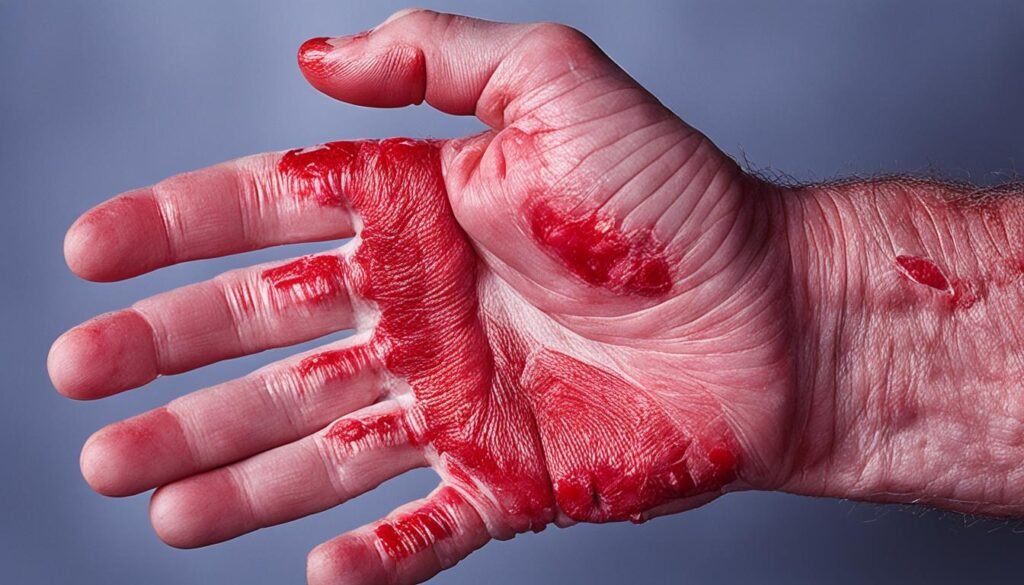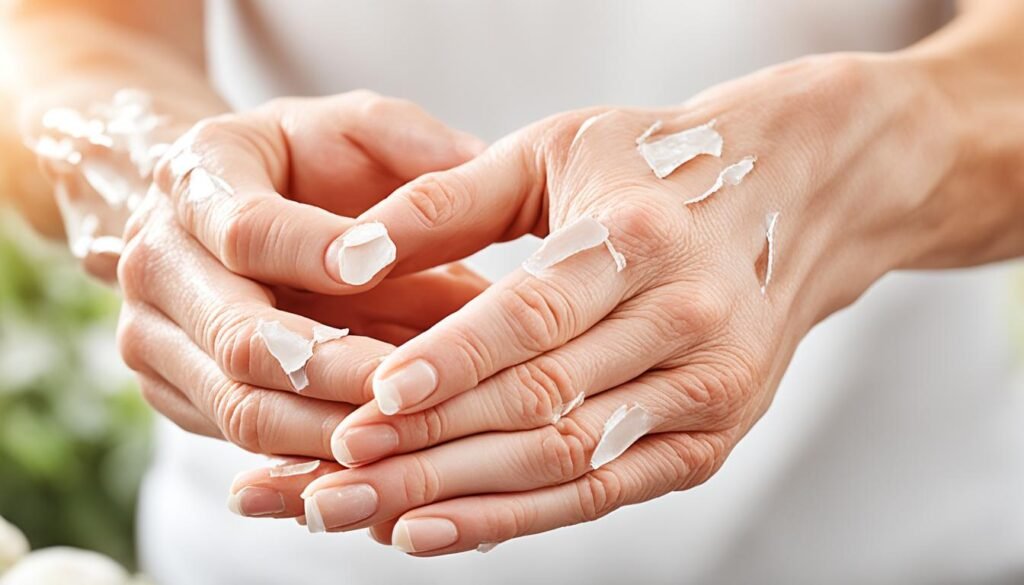Do you suffer from dry, cracked hands that are in desperate need of relief? If so, you’re not alone. Dry hands and cracked skin are common conditions that many people face, causing discomfort and frustration. But fear not! There are effective remedies and treatments that can help heal your hands and restore them to their healthy, smooth state.
From soothing dry skin to moisturizing treatments and natural remedies, this article has got you covered. Discover the best hand care tips, cracked skin relief methods, and skin hydration techniques to say goodbye to dry, cracked hands once and for all.
Key Takeaways:
- Moisturizing regularly with a lotion formulated for dry skin is essential for healing dry hands.
- Wearing gloves can protect your hands from harsh weather conditions and excessive water exposure.
- Reducing stress can help prevent flare-ups of conditions like eczema, which can contribute to dry hands.
- Using aloe vera, gentle soap, and considering medication or UV light therapy are effective treatments for dry hands.
- Prevention is key, so take proactive steps to care for your hands and maintain skin hydration.
What Causes Dry Hands?
Dry hands can be a result of various factors that affect the skin’s moisture balance. Understanding the causes of dry hands is essential for effective treatment and prevention. Let’s explore some common factors that contribute to dry hands:
Aging and Dry Hands
As we age, our skin undergoes natural changes that can lead to dryness. The skin becomes thinner and loses its elasticity, while oil production decreases. These factors can result in dry and dehydrated hands.
Weather and Dry Hands
The weather plays a significant role in skin hydration. Cold and dry weather conditions can strip the skin of its natural moisture. Additionally, exposure to harsh winds can further contribute to dry hands.
Hand-Washing and Dry Hands
Frequent hand-washing is essential for maintaining good hygiene, but it can also contribute to dry hands. When we wash our hands frequently with harsh soaps or sanitizers, the natural oils that keep the skin moisturized get stripped away, leaving the hands dry and parched.
Harsh Soaps and Dry Hands
Using harsh soaps or cleansers can also lead to dry hands. These products often contain chemicals that can be too harsh for the delicate skin on our hands, causing dryness and irritation.
Eczema and Dry Hands
Eczema, a chronic skin condition characterized by inflammation, can affect the hands and cause dryness. The damaged skin barrier in individuals with eczema leads to increased water loss and dryness in the hands.
Understanding the causes of dry hands empowers us to take appropriate measures to prevent and treat this condition effectively.
| Factors | Causes |
|---|---|
| Aging | Thinner and less flexible skin, reduced oil production |
| Weather | Cold and dry weather, exposure to harsh winds |
| Hand-Washing | Frequent hand-washing, use of harsh soaps or sanitizers |
| Harsh Soaps | Using soaps with harsh chemicals |
| Eczema | Damaged skin barrier, increased water loss |
By addressing these causes and implementing proper skincare practices, we can help restore moisture to our hands and maintain their softness and smoothness.
Symptoms of Dry Hands
Dry hands can be uncomfortable and problematic, and they often manifest with a range of symptoms. Recognizing these symptoms is crucial in addressing dryness and taking appropriate steps to prevent further damage to the skin.
Skin Tightness
One of the common symptoms of dry hands is a sensation of tightness in the skin. This tightness can make it difficult to flex or move the hands comfortably. It’s a result of the skin’s lack of moisture, which leads to a loss of elasticity.
Rough Skin
Dry hands often have a rough texture, feeling rough and uneven to the touch. The lack of moisture causes the outer layer of the skin to become dry and coarse, leading to this roughness.
Itching
Itchy skin is another symptom commonly associated with dry hands. The dry and flaky skin can become irritated, triggering the urge to scratch. However, excessive scratching can cause further damage and lead to more severe symptoms.
Flaking
Flaking is a visible sign of dry hands and can occur as a result of the skin’s inability to retain moisture. The accumulation of dead skin cells on the surface of the hands leads to flaking, making the skin appear dull and lifeless.
Cracks in Hands
Cracked hands are a more severe symptom of dryness. When the skin becomes overly dry, it can develop small cracks or fissures, particularly around the knuckles and fingertips. These cracks can be painful and increase the risk of infection if left untreated.
To help visualize the symptoms of dry hands, refer to the table below:
| Symptoms | Description |
|---|---|
| Skin Tightness | A sensation of tightness in the skin, making hand movements uncomfortable. |
| Rough Skin | The skin feels rough and uneven when touched. |
| Itching | An uncomfortable and persistent urge to scratch the dry skin. |
| Flaking | Visible shedding of dead skin cells, making the skin appear dry and dull. |
| Cracks in Hands | Small fissures or breaks in the skin, usually around the knuckles and fingertips. |
Recognizing and understanding the symptoms of dry hands is the first step in finding appropriate treatments and preventative measures. By addressing these symptoms early on, you can help restore moisture and maintain healthier, more comfortable hands.

How to Treat Dry Cracked Hands
If you’re struggling with dry cracked hands, there are several effective treatments that can provide relief and help heal your skin. Here are some proven methods to treat and moisturize your hands:
- Moisturizing: Apply a moisturizer or lotion formulated for dry skin multiple times a day. Look for products that contain ingredients like shea butter, glycerin, or hyaluronic acid.
- Wearing gloves: Protect your hands from harsh weather conditions and excessive water exposure by wearing gloves. This will prevent further drying and irritation.
- Reducing stress: Stress can trigger flare-ups of conditions like eczema, so finding ways to manage stress can help prevent dryness and discomfort.
- Aloe vera: Apply pure aloe vera gel to your hands. Aloe vera has natural moisturizing and anti-inflammatory properties that can soothe and hydrate dry skin.
- Gentle soap: Use a gentle, fragrance-free soap when washing your hands. Harsh chemicals and fragrances can further strip your skin of its natural oils.
In more severe cases, you may need additional treatment options. Consult with a dermatologist who can recommend medication or UV light therapy to address persistent dryness and cracks.
To provide intensive hydration overnight, apply a heavy-duty moisturizer or petroleum jelly to your hands before bed. Cover your hands with gloves or socks to lock in moisture and promote healing.
Increasing moisture in the air can also benefit your hands. Consider using a humidifier in your home or office to combat dryness.
Remember, consistency is key when treating dry cracked hands. Make these methods a part of your daily routine to keep your hands moisturized and healthy.
How to Prevent Dry Hands
Dry hands can be uncomfortable and bothersome, but there are steps you can take to prevent them and maintain healthy, moisturized skin. By following these hand care tips, you can keep dryness at bay and ensure that your hands stay soft and smooth.
Avoid Harsh Chemicals
Avoiding harsh chemicals and irritants is essential for preventing dry hands. Many cleaning products and household chemicals can strip away the natural oils from your skin, leaving it dry and vulnerable. Whenever possible, wear gloves when cleaning or handling chemicals to protect your hands.
Moisturize Regularly
Regular moisturization is key to preventing dry hands. Choose a lotion or hand cream specifically formulated for dry skin and apply it throughout the day, especially after washing your hands. Look for moisturizers that contain ingredients like hyaluronic acid, glycerin, or shea butter, as these can help to replenish lost moisture.
Wear Gloves
Protect your hands from harsh weather conditions and excessive water exposure by wearing gloves. During the cold winter months, gloves provide an extra layer of insulation to keep your hands warm and prevent them from drying out. When working with water or cleaning substances, wearing gloves can also help to minimize contact and prevent the stripping of natural oils from your skin.
Use Mild Soaps
When washing your hands, opt for mild soaps that are gentle on the skin. Harsh soaps can strip away the natural oils and disrupt the skin’s moisture balance, leading to dryness. Look for soaps that are fragrance-free and formulated for sensitive or dry skin.
Maintain Skin Hydration
Maintaining overall skin hydration is crucial for preventing dry hands. Drink plenty of water throughout the day to keep your body hydrated from within. Additionally, using a humidifier in dry environments, such as during the winter or in air-conditioned spaces, can help to add moisture to the air and prevent dryness.
| Hand Care Tips | Description |
|---|---|
| Avoid harsh chemicals | Protect your hands from exposure to harsh cleaning products and chemicals. |
| Moisturize regularly | Apply a moisturizer or hand cream formulated for dry skin multiple times a day. |
| Wear gloves | Protect your hands from harsh weather conditions and excessive water exposure by wearing gloves. |
| Use mild soaps | Choose gentle, fragrance-free soaps that won’t strip away the skin’s natural oils. |
| Maintain skin hydration | Drink plenty of water and use a humidifier to add moisture to dry environments. |
By following these hand care tips and incorporating them into your daily routine, you can prevent dry hands and maintain healthy, hydrated skin. Remember, prevention is key, so make sure to take proactive steps to care for your hands.
When to Seek Treatment for Dry Cracked Hands
While dry cracked hands are a common issue, there are instances where seeking medical treatment becomes necessary. It’s important to know when to be concerned about dry skin and consult a dermatologist or healthcare provider. If the dryness and cracks persist or worsen despite trying home remedies and preventive measures, it’s a sign that professional intervention may be needed.
When dry and cracked hands become a cause for concern, it’s time to reach out for medical advice. Consulting a dermatologist can provide valuable insights into the underlying cause and severity of your dry skin condition. They are equipped to provide a proper diagnosis and recommend suitable treatment options tailored to your specific needs.
Signs You Should Seek Medical Treatment
- The dryness and cracks in your hands do not improve with regular moisturizing and protective measures.
- You experience severe discomfort, itching, or pain in your hands.
- Your dry skin condition is interfering with your daily activities or quality of life.
- There are signs of infection, such as redness, swelling, or pus in the affected areas.
By consulting a dermatologist or healthcare provider, you gain access to their expertise and medical advice. They can evaluate your condition, identify any underlying issues, and recommend appropriate treatment options.
Remember, early intervention is key to preventing further complications and discomfort. Seeking medical treatment for dry cracked hands ensures that you receive the necessary care and guidance to improve the health of your skin.
For more information about professional hand treatment and expert advice for dry hands, you can visit mineraltones.com.
“Seeking medical treatment for dry cracked hands ensures that you receive the necessary care and guidance to improve the health of your skin.”

Taking Care of Your Hands
Taking care of your hands is essential for maintaining healthy skin. If you are experiencing persistent dryness and cracking in your hands, it is best to seek the help of a dermatologist or hand care specialist. In Texas, Skin Cancer Specialists provide professional hand treatments and expert advice tailored to your specific condition. Consulting a professional can ensure proper diagnosis and treatment for your dry hands, allowing you to regain smooth and hydrated skin.
Why Choose Hand Care Specialists
When it comes to treating dry hands, hand care specialists have the knowledge and expertise to address your specific concerns. They understand the unique needs of the skin on our hands and can provide targeted solutions for healing and rejuvenating your skin.
Using advanced techniques and specialized treatments, hand care specialists can help restore moisture, repair damaged skin, and strengthen the skin barrier. Whether you are dealing with dryness, cracks, or other hand-related issues, these experts can create a personalized treatment plan to suit your needs.
Professional Hand Treatment Options
Hand care specialists offer a range of professional treatments to effectively address dry hands. These treatments may include:
- Intense Moisturizing Therapy: Deep hydration treatments to replenish moisture in the skin.
- Exfoliation: Gentle removal of dead skin cells to improve texture and promote skin renewal.
- Paraffin Wax Treatment: A warm wax treatment that helps to hydrate and nourish the skin.
- Advanced Skin Barrier Repair: Innovative techniques to repair and strengthen the skin barrier.
Through these specialized treatments, hand care specialists can help you achieve soft, supple, and healthy hands.
Expert Advice for Hand Care
“Proper hand care goes beyond moisturizing. It involves understanding your specific hand conditions, using the right products, and adopting healthy habits to prevent dryness and damage. By seeking professional advice and treatment, you can ensure the best care for your hands and maintain their overall health.”
Choosing a Dermatologist for Dry Hands
When seeking treatment for dry hands, it’s important to choose a dermatologist who specializes in hand care. Dermatologists are medical professionals who have extensive knowledge of the skin and its conditions. They can accurately diagnose the underlying causes of your dry hands and provide targeted treatments.
When selecting a dermatologist, consider their expertise, experience, and reputation. Look for reviews and testimonials from previous patients to gauge their effectiveness in treating dry hands. By choosing a reputable dermatologist, you can have confidence in the quality of care you will receive.
| Dermatologist | Location | Contact |
|---|---|---|
| Dr. Emily Davis | Austin | (555) 123-4567 |
| Dr. Michael Johnson | Dallas | (555) 987-6543 |
| Dr. Sarah Thompson | Houston | (555) 789-0123 |
Consulting a dermatologist specializing in hand care can provide you with the expertise and guidance needed for effective treatment and long-term hand health.
Causes of Dry Hands in Aging
One of the common issues that people face as they age is dry hands. The aging process brings about changes in the skin, leading to increased dryness and vulnerability to cracks. Understanding the factors that contribute to dry hands in aging can help individuals effectively manage and treat this condition.
The first important factor to consider is the thinning of the skin. As we age, the skin gradually becomes thinner and less resilient. This thinning makes the hands more susceptible to dryness and damage. With a thinner skin barrier, moisture loss becomes more prominent, resulting in dry and rough hands.
Another contributing factor is the reduced oil production in aging skin. The skin naturally produces oils, such as sebum, which help to lubricate and moisturize the skin. However, as we age, the oil glands become less active, leading to a decrease in oil production. This lack of natural oils further contributes to dryness and exacerbates the issue of dry hands.
In addition to these factors, aging has a significant impact on skin hydration. The skin’s ability to retain moisture diminishes over time, leading to increased water loss and dryness. This can be attributed to a decline in certain proteins and lipids that play a crucial role in maintaining skin hydration.
It’s important to note that these changes in the skin are a natural part of the aging process and are influenced by various factors such as genetics, lifestyle, and environmental conditions. While dry hands may be a common occurrence in aging individuals, there are effective ways to manage and alleviate the symptoms.
To effectively address dry hands in aging individuals, it is essential to focus on replenishing moisture and protecting the skin. Regularly moisturizing the hands with a hydrating lotion or cream specifically formulated for dry skin can help restore moisture and improve skin texture. Additionally, using gloves when engaging in activities that may cause further dryness or damage, such as gardening or washing dishes, can offer protection to the hands.
It’s important to remember that taking care of your hands is not just a cosmetic concern, but also essential for overall health and well-being. – Dr. Emily Davis, Dermatologist at Mineral Tones
By understanding the causes of dry hands in aging and adopting a proactive approach to hand care, individuals can effectively manage and alleviate dryness, ensuring their hands remain healthy, smooth, and hydrated.
Tips for Managing Dry Hands in Aging:
- Moisturize regularly with a hydrating lotion or cream for dry skin.
- Wear gloves when engaging in activities that may cause further dryness or damage.
- Protect hands from harsh weather conditions by using gloves or mittens.
- Avoid prolonged exposure to hot water and harsh chemicals, as they can further dry out the skin.
- Consider using a humidifier to add moisture to the air and prevent excessive dryness.
- Consult a dermatologist for personalized recommendations and treatment options.
How to Moisturize and Protect Dry Hands
Moisturizing and protecting dry hands are crucial steps in managing dryness and preventing further damage. Here are some essential tips to help you keep your hands soft, smooth, and hydrated:
Choosing the Right Hand Lotion
When selecting a hand lotion, opt for one that is free of harsh fragrances and contains moisturizing ingredients such as petroleum jelly or shea butter. These ingredients help to lock in moisture and provide intense hydration to your dry hands.
Using Petroleum Jelly for Dry Hands
Petroleum jelly, often known as Vaseline, is a cost-effective and highly effective remedy for dry hands. Before bedtime, apply a generous amount of petroleum jelly to your hands and massage it in gently. Then, cover your hands with gloves to create a seal and allow the petroleum jelly to penetrate deeply overnight.
Overnight Hand Treatment
An overnight hand treatment can work wonders for moisturizing dry hands. Apply a thick emollient hand cream or moisturizer before going to bed, paying special attention to dry and cracked areas. Put on a pair of gloves to keep the lotion in place and maximize its absorption. This method provides deep hydration and promotes healing while you sleep.
Protecting Dry Hands
Aside from moisturizing, it’s essential to protect your dry hands from further damage. Wear gloves when performing household chores, gardening, or other activities that involve contact with water, harsh chemicals, or extreme temperatures. This barrier helps to prevent moisture loss and shields your hands from irritants.
By following these tips and incorporating them into your daily hand care routine, you can effectively moisturize and protect your dry hands, keeping them soft, smooth, and healthy.
| Moisturizing and Protecting Dry Hands | Benefits |
|---|---|
| Choosing the right hand lotion |
|
| Using petroleum jelly for dry hands |
|
| Overnight hand treatment |
|
| Protecting dry hands |
|
Using Super Glue and Liquid Bandages for Cracked Hands
When dealing with cracked hands, some people may consider using unconventional methods such as super glue or liquid bandages to mend the skin. While these products can provide temporary relief, it’s important to understand the potential considerations involved.
Super glue: Super glue contains adhesive chemicals that can dry out the skin. It is generally recommended to only use super glue on superficial cuts and avoid applying it to deep or open wounds. Before using super glue on cracked hands, it’s crucial to thoroughly clean the area and ensure it is not infected. If the crack is deep, bleeding, or shows signs of infection, it is essential to seek professional medical help.
Liquid bandages: Liquid bandages are designed to seal minor cuts and provide a protective barrier. However, some liquid bandages may contain alcohol, which can further dry out already dry and damaged skin. Before using liquid bandages on cracked hands, it is advisable to check the ingredients and opt for alcohol-free options if available. It’s also important to keep in mind that liquid bandages may not be suitable for deep or infected wounds, and medical advice should be sought in such cases.
When considering using super glue or liquid bandages for cracked hands, it’s crucial to read and follow the product instructions carefully. Additionally, consulting a healthcare provider or dermatologist can provide valuable guidance and ensure the best course of action for your specific condition.
Considerations When Using Super Glue or Liquid Bandages on Hands:
- Thoroughly clean and sanitize the cracked area before applying any product.
- Super glue should only be used on superficial cuts, and deep or infected wounds require professional medical attention.
- Check the ingredients of liquid bandages and opt for alcohol-free options if you have dry and damaged skin.
- Follow the usage instructions provided with the products to ensure proper application and effectiveness.
- If the cracks are deep, bleeding, showing signs of infection, or persist despite treatment, consult a healthcare provider.
While super glue and liquid bandages may provide temporary relief, it’s important to address the underlying cause of cracked hands and take appropriate measures for long-term healing and prevention of further damage.
Expert Tips for Healing Dry, Cracked Hands
When it comes to healing dry, cracked hands, experts share valuable tips to help you restore moisture and maintain healthy skin. In addition to the previously mentioned remedies and treatments, incorporating these expert recommendations can make a significant difference in your hand care routine.
1. Use Mild or Moisturizing Hand Soaps: Opt for gentle, pH-balanced hand soaps or moisturizing cleansers that won’t strip away natural oils, further exacerbating dryness.
2. Avoid Irritants and Harsh Chemicals: Take precautions to minimize contact with irritating substances such as strong detergents, solvents, and cleaning agents. Wear gloves when handling such chemicals to protect your hands.
3. Stay Hydrated: Drinking plenty of water throughout the day helps maintain overall skin hydration, including your hands. Proper hydration from within can contribute to softer and more supple skin.
4. Adjust Daily Routines: Make changes to your daily activities to minimize exposure to irritants and friction. For instance, use tools or gloves when gardening or performing tasks that can cause excessive strain on your hands.
5. Seek Medical Attention: If your symptoms persist or worsen despite home remedies, or if you notice signs of infection such as redness, warmth, or pus, consult a dermatologist or healthcare professional for a comprehensive evaluation and targeted treatment plan.
Following these expert tips, coupled with the suggested remedies and treatments, will help you effectively heal your dry, cracked hands and promote long-term skin health. Remember, taking care of your hands is a vital part of overall self-care, so give your hands the attention they deserve.

